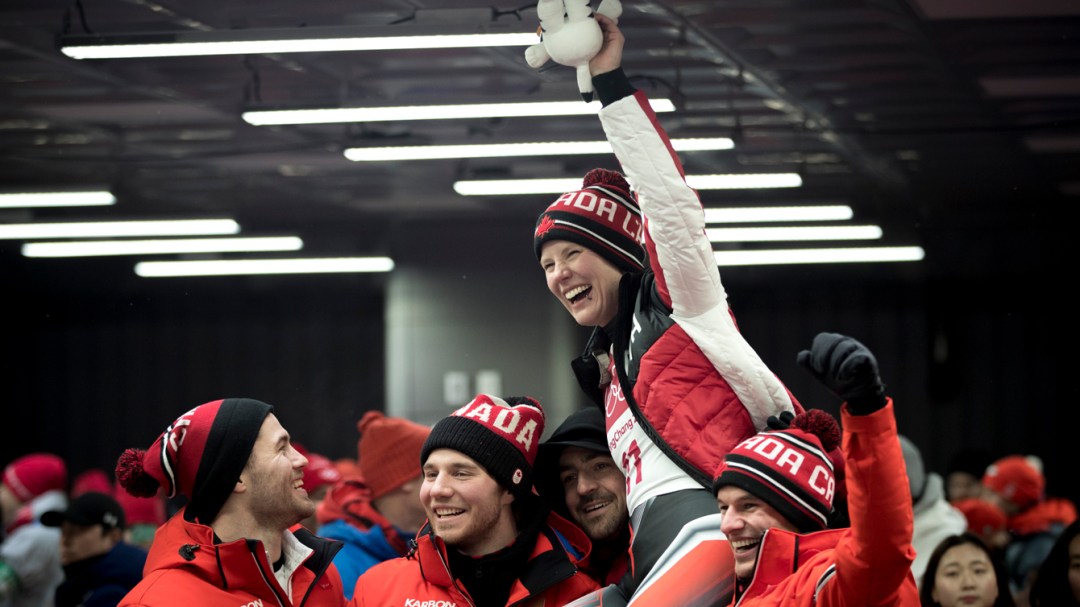Gough engineers historic euphoria for Canadian Olympic luge
It took 46.66 seconds for Alex Gough’s emotions to go from despondent to euphoric.
On Tuesday night in PyeongChang, the 30-year-old civil engineering student and four-time Olympian, became Canada’s first-ever luge medallist at the Olympic Games.
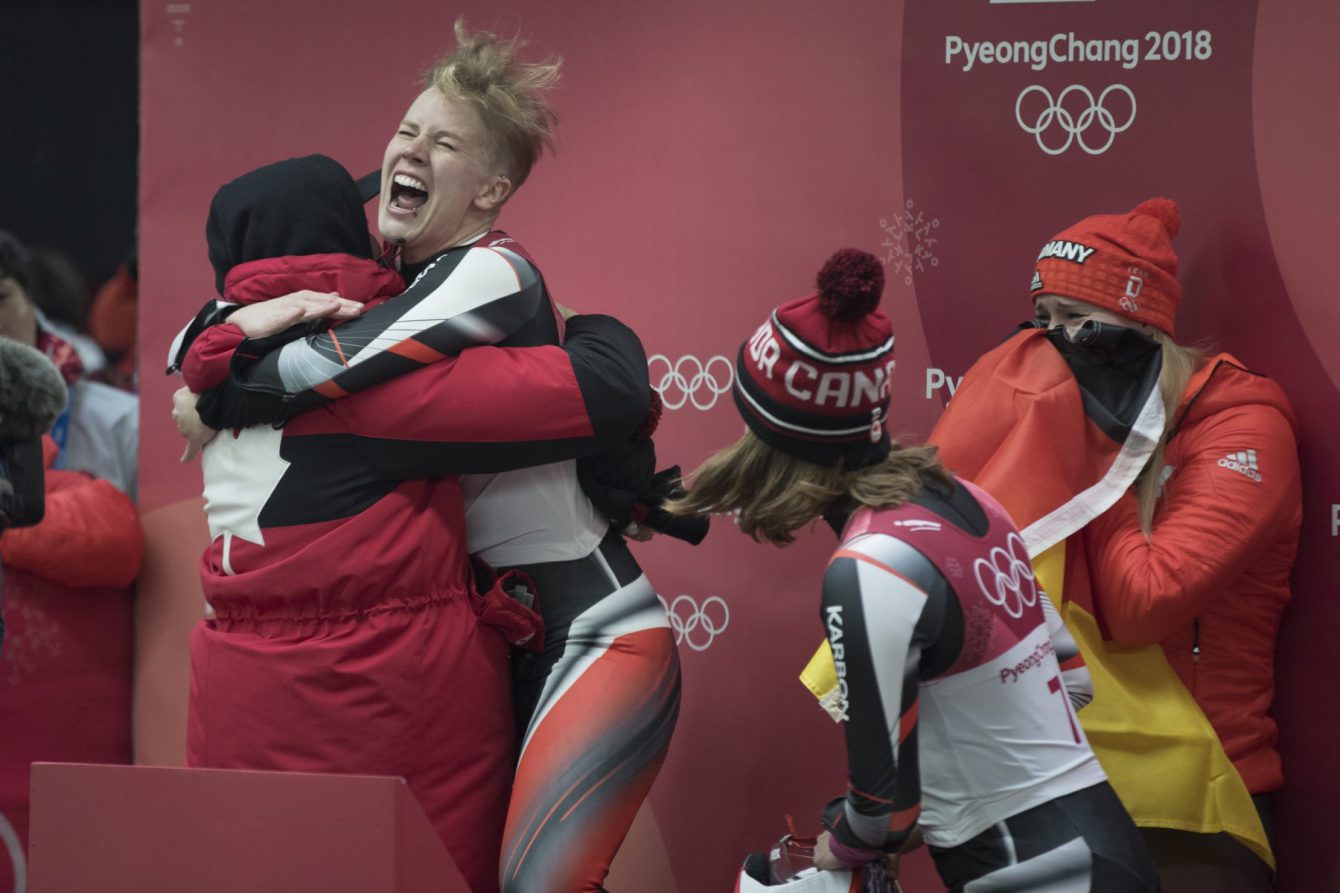
Team Canada’s Alex Gough reacts to winning the bronze medal in the women’s singles luge at PyeongChang 2018 Photo: COC/David Jackson
While she was in a medal position throughout the first three rounds of the competition, following her fourth and final run, Gough suddenly no longer controlled her destiny. Thankfully for Gough, and Canada, fortune finally favoured Canadian lugers at the Olympic Games.
“Disappointment, right through to complete elation,” a relieved Gough said after becoming an Olympic medallist. Hers was the third last sled of the women’s competition, and to ensure a medal, Gough had to cross the finish line in first place or risk being bumped off the podium.
However, Germany’s Dajana Eitberger set the fastest fourth run of the competition, and Gough – up next – couldn’t match her (although she was no slouch herself, sliding to the third fastest time of the final round). Eitberger had guaranteed herself at least a bronze medal, and Gough could only watch.
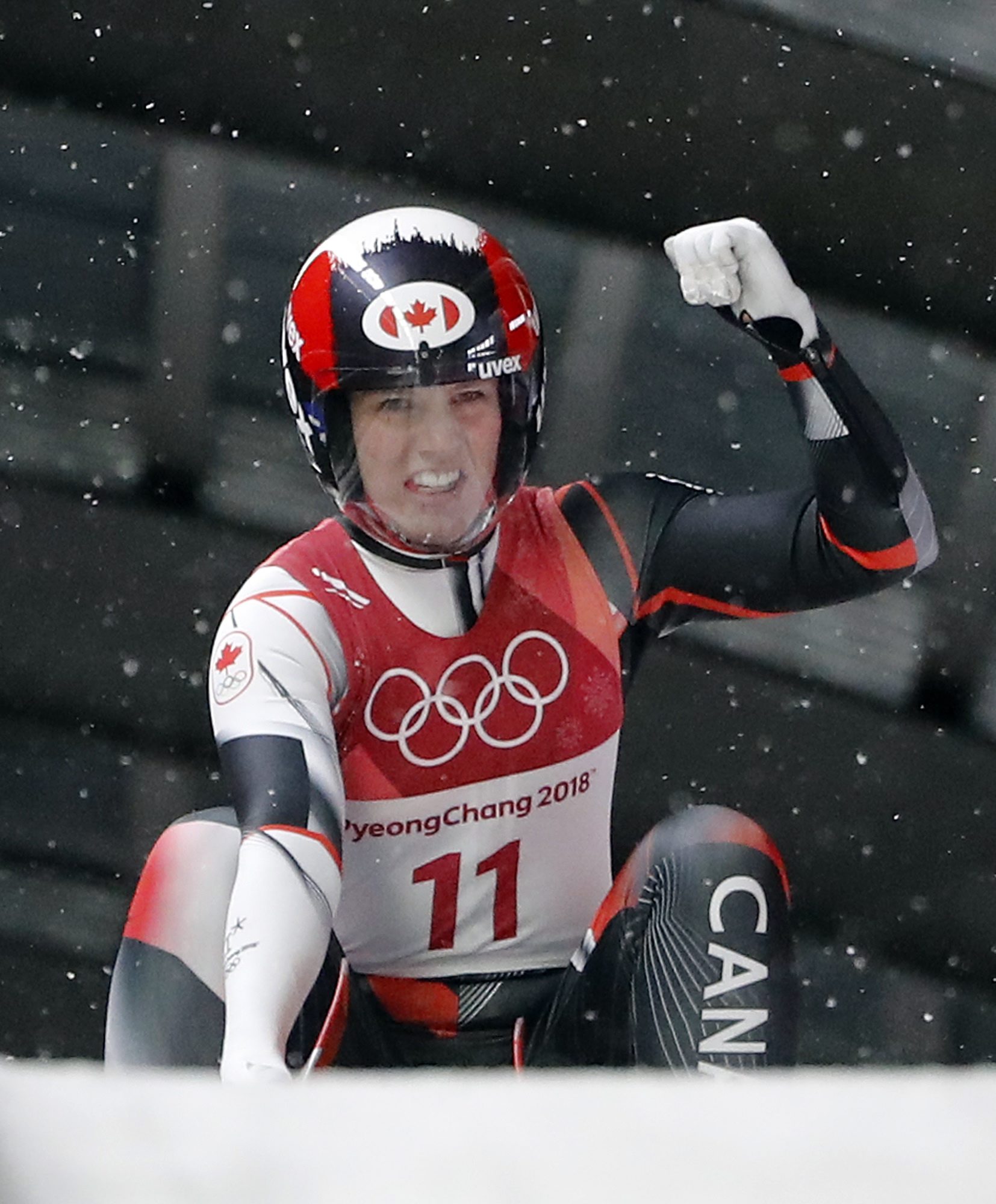
Alex Gough of Canada brakes in the finish area after her third run during the women’s luge final at the 2018 Winter Olympics in Pyeongchang, South Korea, Tuesday, Feb. 13, 2018. (AP Photo/Andy Wong)
“Coming down behind Dajana after the fourth run and knowing with two sleds to go it was probably a fourth-place finish.”
The sting of fourth place is a feeling Gough knows all too well. At Sochi 2014 she experienced it twice, first in the women’s event, and later in the team relay. In between she watched her teammates finish fourth in the men’s doubles. Canadian luge has enough fourth places to last a lifetime.
To make Gough’s outlook worse on Tuesday night, the two remaining sleds that could bump her off the podium belonged to the previous two Olympic gold medallists from Germany. Luge is a Germany-dominated sport and their stars had aligned for a podium sweep just as always planned.
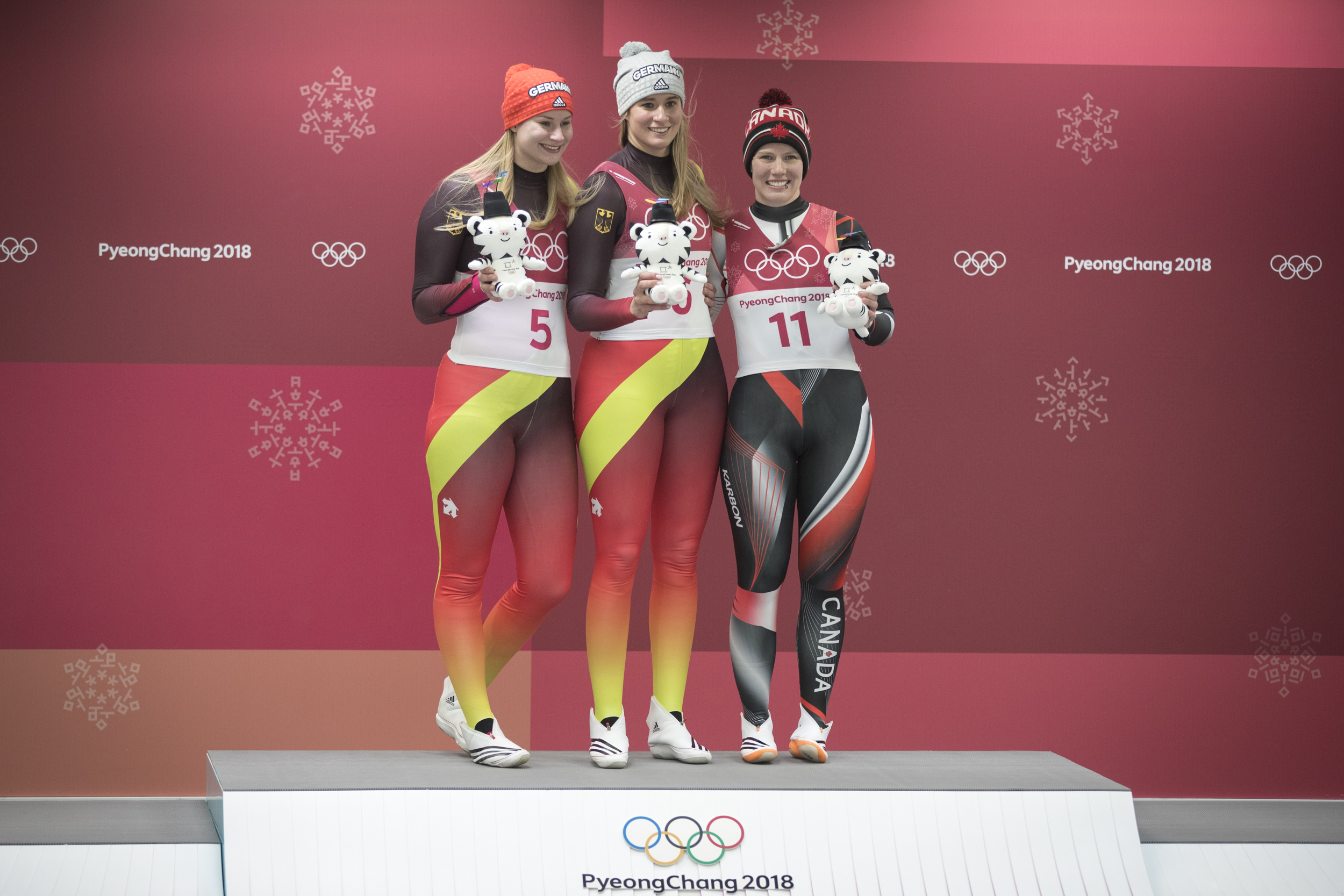
Team Canada’s Alex Gough poses with Natalie Geinsenberger(L) and Dajan Eitberger(C) after winning Bronze in Ladies Single Luge at the Alpensia Sliding Centre, in Pyeongchang, South Korea, Tuesday, February 13, 2018. The medal marked Team Canada’s first even luge medal in history. Photo/David Jackson
“The boys had more confidence in it than I did,” recounted Gough. Canada’s close-knit, supportive team constantly keeps each other motivated, and they were with her as she waited. One of them was Sam Edney, who just finished his own career with a sixth place best-ever Olympic result, and has been there for majority of the Canadian luge highs and lows with Gough through four Olympics, and countless world cup and world championship events.
“Sam kept saying, ‘you’re good, you’re good.’ I’m just over the moon.”
When Tatjana Huefner took to the track for her final run, the reigning world champion, Vancouver 2010 Olympic gold and Sochi 2014 silver medallist, could’ve virtually ended any chance for Gough to get a medal. Following Huefner was defending Olympic champion Natalie Geisenberger, who is about as automatic as it gets in this discipline.
“If you were watching me, I was banging my head against the boards and saying ‘here we go again,'” Gough admitted.

Alex Gough of Canada competes in heat two of women’s single luge during the 2018 Olympic Winter Games in Pyeongchang, South Korea on Monday, February 12, 2018. THE CANADIAN PRESS/Nathan Denette
But Canada’s hard luck lugers finally caught a break when Huefner, despite a blistering start, came through in 46.66 seconds in third place, slower than Gough’s 46.574 that kept her in second, guaranteeing a medal for Canada with one sled to go.
As was expected, Geisenberger, 30, did enough for the gold with a combined four-run time of three minutes, and 5.232 seconds. Eitberger, the 27-year-old who looks poised to take over should Geisenberger step aside in four years, was 0.367 seconds back, while Gough’s total time of 3:05.644 was good for third, just 0.069 seconds ahead of the legendary Huefner.
“For it to turn around for me and to come out with the bronze medal was huge,” Gough said in a post-race press conference. She has a fashion of breaking up German podium sweeps, and did it one more time when it counts the most.
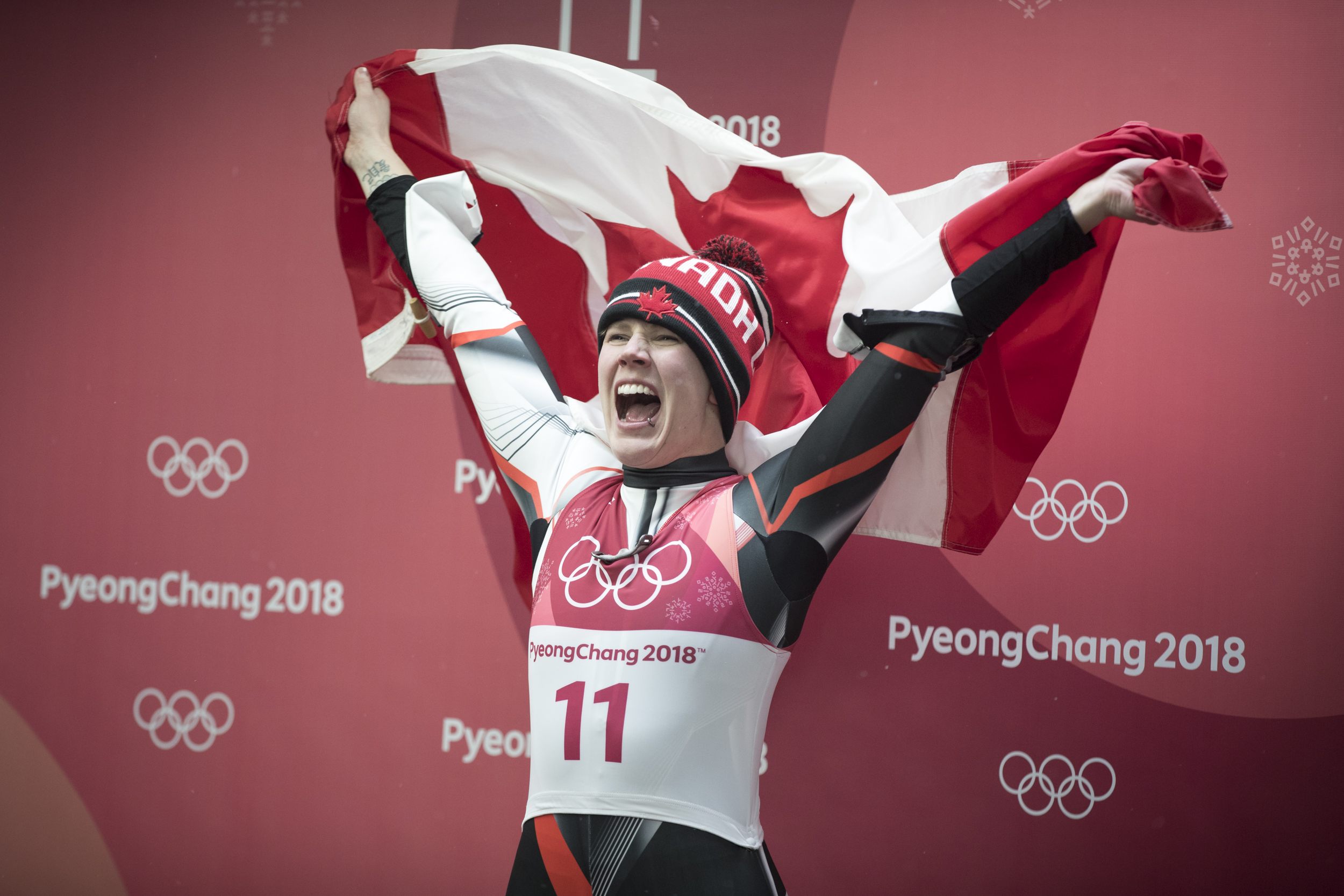
Team Canada’s Alex Gough celebrates winning Bronze in Ladies Single Luge at the Alpensia Sliding Centre, in Pyeongchang, South Korea, Tuesday, February 13, 2018. The medal marked Team Canada’s first even luge medal in history. Photo/David Jackson
“It’s what I came here to do. I didn’t give up. I put together what I thought was a good run. It was enough in the end…I felt like the runs were really solid.”
Every one of Gough’s runs were among the four fastest in the field each round. Her consistency was superb. Aside from Huefner, she also beat Erin Hamlin of the United States, who four years ago edged out Gough to become the first non-European to win an Olympic luge medal.
In fact, Gough wasn’t the only Canadian to finish ahead of Hamlin. Kimberley McRae repeated her fifth place finish from Sochi to show a level of consistency at this stage that may make the 25-year-old an Olympic medal contender in four years, especially if the likes of Geisenberger, Huefner and Gough – all in their 30s – hang up their sleds.
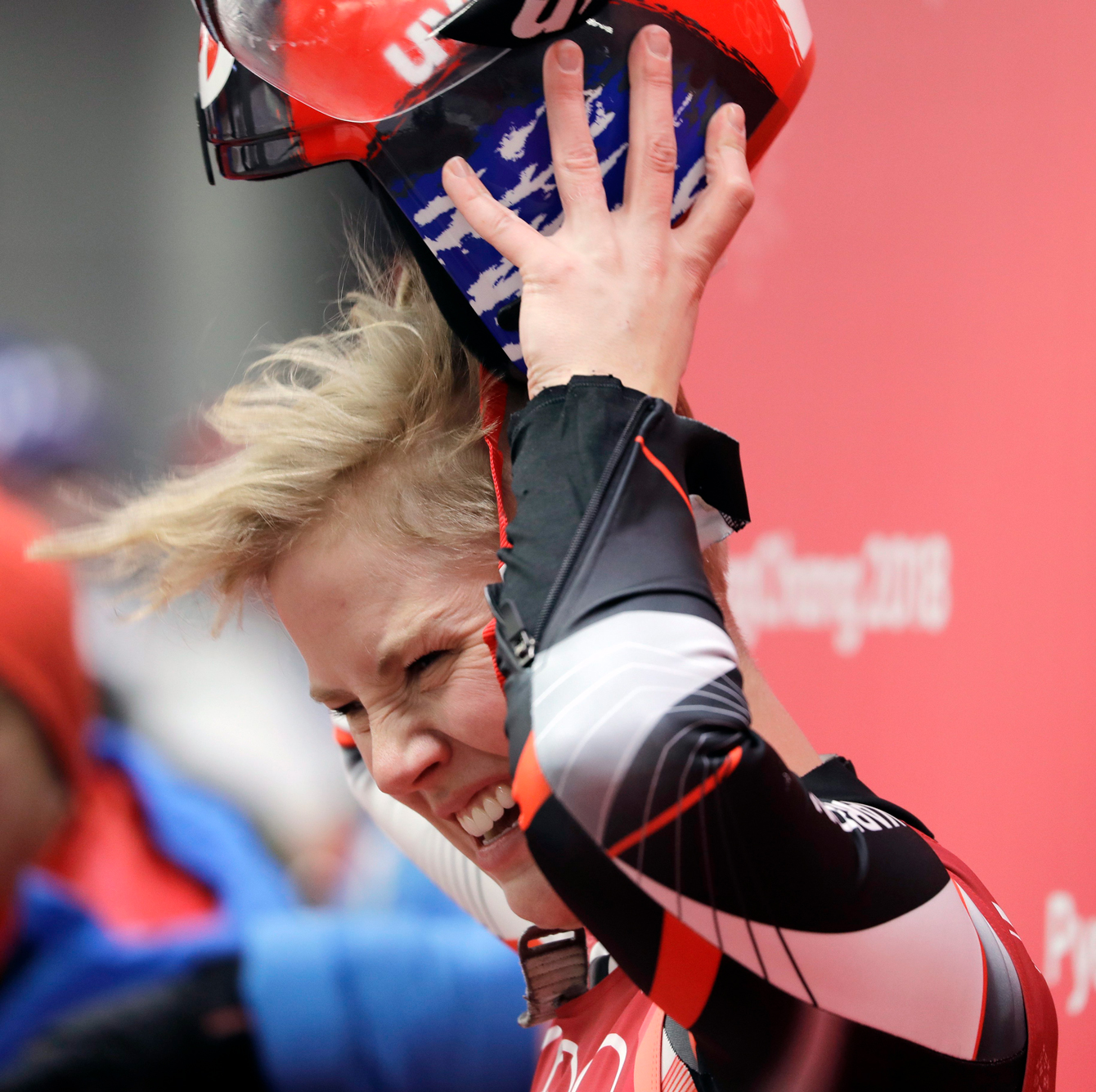
Alex Gough at PyeongChang 2018 on February 12 following her second run in women’s singles luge (CP).
And while McRae’s Olympic result might come another day, Tuesday night in Korea belonged to the queen of Canadian luge, who for years carried the sport on her back with massive performances, including two world championship bronze medals, and bearing the emotional weight of being shut out in Sochi only to get better.
“It’s a culmination of all that hard work. It’s everything paying off. It’s four years of keeping going and committing to another Games and getting a reward at the end of it.”
And Gough will be first to admit she didn’t get to this historic place alone.
“We have so many family and friends and everybody out here. All of my family came. I’m so happy they are here, having them and having their support is indescribable. Without them I wouldn’t be here.”

